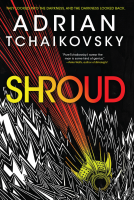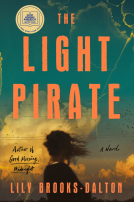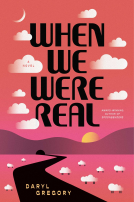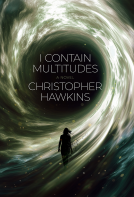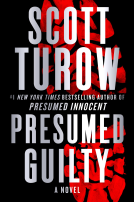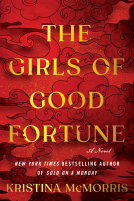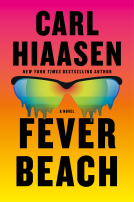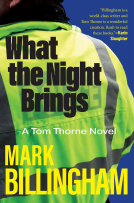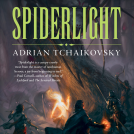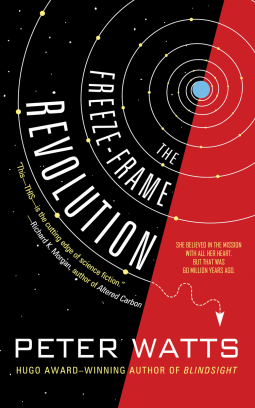
The Freeze-Frame Revolution
by Peter Watts
This title was previously available on NetGalley and is now archived.
Send NetGalley books directly to your Kindle or Kindle app
1
To read on a Kindle or Kindle app, please add kindle@netgalley.com as an approved email address to receive files in your Amazon account. Click here for step-by-step instructions.
2
Also find your Kindle email address within your Amazon account, and enter it here.
Pub Date Jun 22 2018 | Archive Date Aug 07 2018
Talking about this book? Use #TheFreezeframeRevolution #NetGalley. More hashtag tips!
Description
“This—THIS—is the cutting edge of science fiction.”
—Richard K. Morgan, author ofAltered Carbon
She believed in the mission with all her heart. But that was sixty million years ago.
How do you stage a mutiny when you're only awake one day in a million? How do you conspire when your tiny handful of potential allies changes with each job shift? How do you engage an enemy that never sleeps, that sees through your eyes and hears through your ears, and relentlessly, honestly, only wants what's best for you? Trapped aboard the starship Eriophora, Sunday Ahzmundin is about to discover the elements of any successful revolution: conspiracy, code—and unavoidable casualties.
Note from the publisher: Red letters in the final print edition (and highlighted letters in the final e-book) will indicate special bonus content from the author.
A Note From the Publisher
Advance Praise
Praise for The Freeze-Frame Revolution
A Publishers Weekly Book of the Week
“This is definitely vintage Watts—outstanding, exciting, and terrifying.”
—Cory Doctorow, author of Little Brother and Walkaway
“The Freeze-Frame Revolution is a delicious morsel of hard science fiction . . . The setup of the book is irresistible, and the science is high-concept, but the story is driven by Sunday’s relationships and her conviction in herself and her companions.”
—Washington Post
“The latest from Watts (Blindsight, 2006) packs a significant punch into a small package.”
—Booklist
“[STARRED REVIEW] In this short, tight novel that contains vast science-fictional speculation, the human crew of the construction ship Eriophora spends 66 million years building interstellar wormhole gates, so they have lots of time to ponder issues of purpose. Sunday Ahzmundin, on a quest to find a missing crewmate, has to deal with another coworker, Lian, who is traumatized after the ship is damaged by one of the “occasional demons” that pop out of newly opened gates. Dropping in and out of suspended animation as scheduled by the Chimp, the AI that runs the ship, Sunday begins to uncover the secrets behind Lian’s subsequent death and the disappearances of other crew members, learning what hides beneath the ship’s closed and rigidly structured society. Watts (Echopraxis) puts the concept of humanity under the knife, teasing out how Chimp’s programming and Sunday’s loyalty can both tie them together and set them at odds. Watts pits the drive toward success against the need for connection, leading to an ending as open and as expansive as the universe. SF fans will love this tale of bizarre future employment and genuine wonder.”
—Publishers Weekly [ A Staff Pick / Best Summer 2018 Read]
“The Freeze-Frame Revolution (Tachyon), the shortest and latest novel from Canadian Peter Watts, is as brilliant and enticingly acute as any of his earlier and longer work.”
—Seattle Review of Books
“Part thriller, part hard-SF vision, part existential nightmare . . . impressive and intriguing.”
—Locus
“Darkness and awesome technology lurk in Peter Watts’new book, The Freeze-Frame Revolution.”
—Vernor Vinge, author of A Fire Upon the Deep
“Peter Watts blows my mind every single time.”
—Kelly Robson, author of Gods, Monsters, and the Lucky Peach
“[STARRED REVIEW] Entertaining and provocative, brilliant and ambitious, The Freeze-Frame Revolution is compelling science
fiction with heart.
—Foreword
“The Freeze Frame Revolution is the purest driven high concept SF . . . as vivid and carnal and profane as the headiest of high-end literature.”
—Richard Morgan, author of Altered Carbon
“It's science fiction on a grand scale, covering countless millennia and light-years. It's a story that doesn't leave the reader comfortable, and it's terrific. But if you wanted comfortable, you wouldn't be reading anything by Peter Watts.”
—MT Void
“Watts takes familiar-seeming SF tropes and accelerates them towards lightspeed, until they become something chillingly other. A gripping tale where galactic timescales collide with biology and age-old human dilemmas.”
—Hannu Rajaniemi, author of Summerland and The Quantum Thief
“Fast, rich, and cool—The Freeze-Frame Revolution fascinates!”
—Greg Bear, author of Eon and Take Back the Sky
“A savvy, fast-paced, vivid mix of humans way off-planet, pounding biology, robotics, cyberpunk, and even music. That's right, everything you've come to expect and enjoy from Peter Watts, and maybe a little more. This is one of his best—short, unforgettable, highly recommended.”
—Paul Levinson, author of The Plot to Save Socrates and The Silk Code
“In The Freeze-Frame Revolution, Peter Watts takes us millions of years into the future and hundreds of light-years away, where an isolated fragment of humanity must confront exotic physics, unfathomable entities, and the unforeseen consequences of their own technologies. But it is a profoundly human story about people, people not unlike us, under inescapable stress. A brilliant, thoughtful story bursting with radical ideas.”
—David D. Levine, author of the Andre Norton Award-winning Arabella of Mars trilogy
“A gripping story of a deep human future—the dependent relationship between human and AI tangles and grows with the delicious creep of suspense to the very last page. Watts is a poet when it comes to science. A pleasure to read.”
—Justina Robson, author of Keeping it Real
“The Freeze-Frame Revolution is a slow-motion rebellion as heart-stopping as any roller coaster ride and will delight readers across the science fiction spectrum. It was a joy to read and I found myself unable to put it down once I got started.”
—K. B. Wagers, author of Before the Throne and the forthcoming Farian War trilogy
“Peter Watts is a triple threat: exacting hard science extrapolation, an imagination that runs hot enough to give you contact burns, and a gift for thrusting his characters in situations that will expand the mind while shattering even the most guarded of reader hearts. In The Freeze-Frame Revolution, he puts a handful of fragile human beings into a mind-bending, explosive and utterly inhuman situation, and lights a ten-thousand year fuse. Unforgettable!”
—A. M. Dellamonica, author of Indigo Springs
“The most protracted battle of the minds ever—human vs machine. Brilliant.”
—David Marusek, author of Upon this Rock and Counting Heads
“Peter Watts has created a sci-fi work of art where every word is refined and has a purpose. I highly recommend this work to lovers of science fiction.”
—Infinite Text
“I’m a big fan of author Peter Watts, and this novella The Freeze-Frame Revolution doesn’t disappoint. Interesting characters, fascinating science, and just great storytelling.”
—The Best Sci Fi Books
“Very highly recommended, dark, hard science fiction.”
—She Treads Softly
“Sunday’s voice—Watts’s prose—is jagged, hip, entrancing,
smart, literate and funny.”
—Paul Di Filippo, Locus
“Peter Watts certainly knows how to keep you on edge . . . The
Freeze-Frame Revolution is a fascinating novel.”
—Strange Alliances
“Watts is an original thinker and a
bold storyteller, here at the top of his considerable form. This is one of the
year’s best science fiction odysseys.”
—Intergalactic
Medicine Review
“The
Freeze-Frame Revolution marks the triumphal return of Peter Watts . . .
Definitely one of the speculative fiction titles to read in 2018.”
—Fantasy Hotline
Praise for Peter Watts
“Watts, undoubtedly, is a genius.”
—Medium
“Peter Watts is some precisely engineered hybrid of Lucius
Shepard and Gregory Benford, lyrical yet hard-edged, purveyor of sleek surfaces
and also the ethical and spiritual contents inside.”
—Locus
Marketing Plan
-Promotion at major trade and genre conventions, including BEA, ALA, Readercon, the International Conference for the Fantastic in the Arts, and the World Science Fiction convention.
-Features, interviews, and reviews targeting literary and genre venues, including the Washington Post, NPR, the Los Angeles Times, The New York Times, the Chicago Tribune, and the San Francisco Chronicle
-Author appearance tour dates TBD
-Planned galley distribution and book giveaways to include NetGalley, Goodreads, Edelweiss, Tor.com, and additional online outlets
-Advertising and promotion in national print, online outlets, and social media
Available Editions
| EDITION | Other Format |
| ISBN | 9781616962524 |
| PRICE | CA$22.50 (CAD) |
| PAGES | 192 |
Featured Reviews
So let's assume there's some way of cheating the restriction that nothing goes faster than light - wormholes, warp gates, hyperspace, call them what you will. But not the sort you carry with you, <i>Star Wars</i>-style - the stargate sort that works a bit like a tunnel network, and needs to be placed out there the slow way by someone who doesn't themselves have the benefit of the cheat they enable. Often, a science fiction setting will say that some long-ago race of forerunners, perhaps vanished, laid out the network ready for our heroes. <i>The Long Way To A Small, Angry Planet</i> poked at what it might be like if you actually had to lay them out yourself but, being a fundamentally upbeat book, it still leaned into the project being a matter of months or years, rather than aeons.
Peter Watts doesn't really do upbeat.
This is the story of the poor bastards sent out from Earth to build the gate network. They're in suspended animation between stops (hence the title), and the book doesn't even really get underway until they've already been gone for millions of years. Every so often, when they open a new gate, they get an intimation of how drastically Earth must have changed since they began, how meaningless their mission must have become in any terms they understand. Some of them are fine with that - they were bred for this, after all, and as per that MJ Hibbett song, it's an opportunity to find out how the story ends (even if you're almost certain not to understand the answer). Others are less so. But when you're that far out, on a ship run by an AI with set mission goals, and you're only awake for a week or two every few millennia, how exactly do you change your situation? Well, there are ways, or at least there may be. But as ever with Watts, the nature of consciousness looms large, and much of the fascination lies in seeing the asymmetric warfare of devious primates versus a computer that's incredibly smart in some ways, entirely dumb in others, and not even really against them, just following the parameters laid out for the mission by engineers as dead at this point as the dinosaurs are to us. As chewy as it is bleak, which is very.
(Netgalley ARC)
 Brad H, Reviewer
Brad H, Reviewer
The Freeze-Frame Revolution by Peter Watts
My rating: 4 of 5 stars
This is some classy hard-hard SF. :) Black hole/worm hole drive using new and real theories? Hell yeah.
But beyond that, I love the whole idea of short periods of wakefulness during a single trip that takes 65 million years.
Add a rebellion against IBM... I mean HAL... I mean CHIMP, without expecting anything to go quite the way that 2001 went, or even remotely like it, and we've got a really fascinating story.
Watts knows how to build really fascinating locations and situations... maybe better than almost any other writer. He never rests on a single awesome idea but adds to it and introduces even more interesting wrinkles such as watching an AI dance, or truly alien intelligences, or maybe just freaking out because the rest of humanity must necessarily be dead during the scope of your mission.
But add a complicated revolution among sleepers using old D&D manuals? Adding jarring notes during a musical composition?
Oh yeah, the devil is in the details. :)
I'm enjoying this novel(la according to the author) through Netgalley as an ARC, but this wonderful reviewer here: Claudia's Review has pointed out that this is not a standalone story. She's even provided a link to the author's website for the other stories (free to download) as well as the suggested reading order. Thank you!
I might be reading out of order, but I don't mind it all that much. Watts is a thinking man's hard-SF writer. I expect to be at least a little challenged and delighted. As anyone who has read Blindsight knows. :)
So, I’ll start out by saying that this story has a really unique and fascinating premise. Sunday Ahzmundin is part of a crew of 30,000 people that are flying through the galaxy on their spaceship, the Eriophora. I’m not sure I 100% understood the technology that is involved, but from what I do think I understand a bit, it uses a singularity drive (so, a black hole), and they continuously make ‘gates’ with it, which I believe are used to make wormholes that they travel through.
That’s not really important, in the grand scheme of things, but what is important is that out of these 30,000 people, only about 5 or 6 people, usually the same ‘tribe’, but sometimes mixed up a bit, are awake at a time. Everyone else is… well, pretty much dead. Frozen, or… in stasis… but still, mostly dead. The imagery is there. The place they’re stored are called crypts. The vessels in which they are stored are coffins. They’re only woken up once every few thousand years, and even then, only for a few days at a time.
So, this crew of people have been out in the universe, travelling on their mission… for 60 million years. But for them, maybe… twenty something conscious years have actually passed. Something they remember from a day ago really happened thousands of years ago. The ship’s AI, an entity called The Chimp, talks to them and helps them through their days, wakes them randomly depending on perceived necessary specialties depending on where they are. A lot of people are starting to… not really trust Chimp though… Some people are starting to want more freedoms… And some are noticing that some shady stuff is happening…
And so…. space-mutiny! But… well, I mean how do you coordinate something like that when you and your mutineers are only awake one day of every thousand?
I was absolutely enthralled by this book. As I said, I’m not certain that I ‘got’ all the intricacies of the science/technology and probably theoretical physics that this ship runs on, but I absolutely loved the premise and the adventure that Sunday and her friends had. I really liked Sunday as a character as well. She’s pretty snarky at times, which I always like in a character. Having her story be in first person, seeing things from her point of view, which I could somewhat relate to as a sometimes-snarky gal who swears a lot… well, even when I didn’t always get it, it didn’t matter. I was never bored with it. I never felt like the really sciencey bits (that didn’t always so much go over my head as smacked me in the forehead a bit) really made this hard to understand or boring. I’m not sure if I can put this more eloquently, lol. You don’t have to be a theoretical physicist to enjoy this story. It’s pretty hard sci-fi which I’m not always a fan of, but I hoped since I liked Blindsight that I’d like this one, and it turns out that I liked this one a lot!
It’s also pretty short. Maybe not quite a novella (or maybe just a very long novella), but not as long as I was expecting it to be. Just long enough! I finished it in a couple of hours.
Thanks to the author as well as Tachyon Publications via NetGalley for the review copy. :)
 Joseph K, Reviewer
Joseph K, Reviewer
I've been a fan of Peter Watts since I read BLINDSIGHT, his 2006 novel that was a finalist for the Hugo award in 2007. I remember not being really sure of what I was reading, but I was convinced that Watts was writing some pretty cool stuff of the type I hadn't much seen before. His material is not for the weak of heart; it's dark, thought provoking, and in general not very optimistic. It's smart, layered, and involved. It's not summertime beach reading.
Watts' latest novella - or novel, if you believe the publisher (according to a footnote in the acknowledgements) - "The Freeze Frame Revolution", fits all those descriptions. It is, apparently, part of a sequence of stories called Sunflowers. One of the stories in the sequence, The Island, won the 2010 Hugo award for Best Novelette. The Island, which I made a point of mentioning in my review of Watts' short story collection Beyond the Rift, follows "The Freeze Frame Revolution" chronologically in the sequence. The other stories are "Hotshot" and "Giants", which I have not read. I don't believe that reading "The Freeze Frame Revolution" without reading the others will detract from the reader's enjoyment of the story, but of course your mileage may vary.
As with "The Island", the story tells the tale of the crew of a star ship that is travelling throughout space to build a network of wormholes that will allow interstellar travel (and thus get around the problem of the limitation imposed by the speed of light). It actually didn't occur to me until I was reading "The Freeze Frame Revolution" that those wormhole networks really had to be built by someone; they can't just mystically appear, although most novels don't spend much time, if any, talking about how the networks came to be. There are several thousand crew members, and every few thousand years the ship's AI, CHIMP, wakes up a subset of them to help build the next gate in the network. In general, CHIMP doesn't really need the human crew in most cases, but just in case something goes wrong some humans are awakened - to keep an eye on things. These crew members are only awake for a few days at a time, then go back to into hibernation.
And thus, we see the scale of the story and the challenge presented to the crew. The mission is lasting millions (if not billions) of years; after all, the ship, the Eriophora - an apt name given its function - does not have the benefit of the very wormhole gate network they are building. The mission planners are certainly no longer around, so the crew questions whether the mission is even useful any more. Has humanity developed some advanced technology that supersedes the need for the wormhole gate network?
And how do you make friends, how do you communicate with the people you do meet? CHIMP determines who is awake at any given time. While the crew is divided into groups such that group members work together, not all members of the group are awakened at the same time, and sometimes people outside the group are awakened to give the work teams a mix, a different perspective How do you communicate across the millennia, especially if you're trying to organize a group with common interests? And how do you something in secret right under the nose of an AI that can monitor your every move, an AI that has control over everything on the ship, including who lives and dies?
While the basis to the story is the building of the wormhole gate network, this is really a story about humanity trying to perform a mission they're not sure has meaning any longer. It's dark, and it's not pleasant - but it's vintage Peter Watts. It's an engaging piece of fiction that will have you wondering about the makers of the next wormhole gate network you read about in someone else's story - and whether they ever finished the project, and if they did, what happened after that. It's science fiction on a grand scale, covering countless millennia and light-years. It's a story that doesn't leave the reader comfortable, and it's terrific. But if you wanted comfortable, you wouldn't be reading anything by Peter Watts.
 Jack S, Reviewer
Jack S, Reviewer
This is the third of Watt's books that I've read, the first two being the Firefall duology. I was amazed then at the depth and creativity that Watt's had into his books, and utterly unnerved at the pure alienness of them. This book is nearly completely different. For one, it's much more accessible; both the language and the science behind the technology are much softer than his previous novels. I won't say it's completely handwavey, but it is a hell of a lot closer than Echopraxia. I think.
Anywho, to the book. The story tells of Sunday, one of the crew of a giant asteroid flying through space creating gateways for humanity to follow. The premise being that earth has become uninhabitable or somesuch, and need to now populate the galaxy. The crew of 30,000 get taken out of cryo every hundred or thousand years to help supervise the building of the gates, and then get put back to sleep until next time. In such a manner, the ship continues on for millions of years.
This is were the plot got interesting (and, at the start, a bit confusing). Only half a dozen to a dozen of the crew are awake at a time, so they only ever get to know a few others, even though this journey spans millions of years. Why is the system set up like this? We find out later, but for the first bit it's this intriguing plot point dragging you in.
Pacing wise, it's hard to really comment. The main character, Sunday, is woken and put to sleep in large sections of time, and simply recounts the events quite quickly. That said, I think it worked really well. None of the events are ever so special that you wise you'd read more about them, and the pace keeps a quick pace towards the second half, so you're always looking forward instead of back.
Overall, this was a great read, and I really wish it had gone on for longer and explored more aspects, but as it was it was such an enjoyable read and some mystery is nice to have now and again.
A 65 million year mission ran almost entirely by AI with a random selection of human crew woken up every 1000 years to check up on it - but what if the mission starts to go wrong? How do you stage a mutiny when you are only awake one day in a thousand years, when the handful of people you wake up with are chosen by the AI and the AI watches every move from your own eyes?
The premise of Freeze Frame Revolution is one that greatly intrigued me to pick it up, kept me interested whilst reading and stayed with me long after I had finished it. The story explores humanity thriving in an environment where a mission they fully believed in may now be obsolete and where they have to trust an AI built by people long since dead whose objectives aren’t quite clear. It’s not a light read or a happy one but it’s very interesting and gripping.
Sunday is a character you can relate to in a situation that’s very hard to imagine. Her sympathies towards the AI Chimp and her understanding that he is just doing what he is programmed to do is refreshing. The other characters, Chimp included are well-rounded and interesting, with enough mystique about them to make you distrust them.
Although I enjoy reading sci-fi I did feel like some of the terminology and technical parts of the book did go over my head a bit at times. Upon reading other reviews I realise now that this is loosely part of a series. Although I did enjoy it as a standalone piece I did feel that some parts were not particularly well explained and there were some hints to the wider story world that weren’t elaborated upon – if anything it has made me want to read the others in the series now! I also felt the ending was probably the weakest part of the book but that might make more sense if it’s part of a series.
Overall The Freeze Frame Revolution is a must-read for sci-fi lovers; it’s short and sharp and will stay with you long after you’ve put it down. Thank you to NetGalley and Tachyon Publications for the chance to read the ARC in exchange for an honest review.
 Steven S, Educator
Steven S, Educator
This new novella by Peter Watts is part of a series of stories he has been writing, on and off, for some time now. The series seems to be called Sunflowers. The other stories to date (Hotshot, The Island, and Giants) are available for free download from the author's website: .
The basic idea is this: a group of human beings live and work on a spaceship that is circling the galaxy, at a substantial fraction of light speed, in order to create wormholes - so that future spaceships from Earth will be able to move from star system to star system quickly and easily. The thousands of people on the ship spend most of their time in cryogenic suspension, without aging, as the ship takes millions of years to traverse the galaxy. An onboard artificial intelligence runs things, and only awakens a few of the human beings or brief periods when it encounters situations that are too difficult for it to deal with by itself (mostly when they actually need to install a wormhole).
It quickly becomes absurd: the narrator, Sunny, has only had a few years in toto alive, awake, and ageing, while the ship as a whole has been traveling for something like 55 million years. Nobody knows what has happened on Earth in that vast stretch of time, nor even whether human beings (or their evolutionarily changed descendents) still exist.
Each story explores a different aspect of this dilemma. The Freeze Frame Revolution deals with the relations between the crew and the AI (which they call The Chimp, because of its supposedly limited intelligence - which has been deliberately limited so that it will not come off as superior to the living human beings aboard). Crew members have reason to believe that The Chimp has been lying to them and manipulating them, and they want to put a stop to it. This entails plotting to take over the ship from the AI - the conspiracy takes millennia of actual time to unfold, because nobody is awake for more than a week or so at a time, and only a small portion of the crew is awake at any particular time - they need to send messages to one another which endure over the long hibernation period, and which the AI is unable to read (or even to be aware of the existence of). It is difficult, but they manage to do it -up to a point. The novella is a somber one, because it deals with a situation in which ostensibly free people do not actually have much of a choice, or much room to maneuver, and where the challenge of dealing with the essentially nonhuman intelligence like the AI is a difficult and perhaps impossible one. The book, like all of Watts' fiction, is intense, intellectually intriguing, and very skeptical about long-range human prospects.
 Nikki V, Reviewer
Nikki V, Reviewer
4.5 rounded up to 5 (Rating is for the entire Sunflower Cycle series so far)
I’ve held off reviewing this for some time now. Once I finished reading it, I just couldn’t fully wrap my head around what I had just read. In attempting to understand the story better, I went and looked at some other reviews of people who enjoyed the story to hopefully gather some details I may have missed. I’m so glad I did that because I found this great review by Claudia - https://www.goodreads.com/review/show..., where she explains this is part of a larger set of stories called the Sunflower Cycle. Turned out there were 3 other stories in that world and they all kind of go together. Based on Claudia’s recommendation, I went and read the other 3, in the order she advised (Hotshot, The Freeze-Frame Revolution, The Island, and Giants), to get a better sense of the story and the world as a whole that Peter Watts created.
The Freeze-Frame Revolution is essentially about a seriously long-term revolution going on aboard the spaceship, Eriophora. The job of the crew, also known as spores, and the on-board AI, whom everyone refers to as “Chimp”, is to build a web of wormholesque gates throughought space in a spiral moving outwards from Earth and out into the great beyond of unknown space. This way humans can hopefully succeed at interstellar travel and find another home as Earth’s resources are greatly depleted and humanity will not survive if they don’t find another planet.
At this point in the Sunflower Cycle story arch, they have been travelling for essentially millions of years as they jump through space. Every spore onboard has been raised specifically for this mission, and because they need to be alive in case anything happens, the onboard AI runs the day-to-day of the ship, and each spore is only awake for about a week at a time out of a thousand years.
Some on the ship are starting to question the mission, as well as the intentions of the AI. Thus, we have mutiny aboard the ship as the people decide they want to overthrow the onboard AI. But staging a coup is a little difficult when you’re only awake for a week out of a thousand years at a time, and typically not awake with the same people. Musical scores and D&D manuals assist the main character, Sunday, and her fellow friends and crewmates as they plan a coup a millennia in the making.
I’m so glad that I went and read the other 3 stories before deciding on a final rating and review for this book. Peter Watts has created an exceptionally strange, surreal, but wholly sci-fi world that totally drew me in and had me wanting more. If you decide to go into this adventure know you will never get all your questions answered, and some things will never be fully explained. He also doesn’t write easy to read sci-fi. If you like your sci-fi to be well explained and fluid, you’re looking in the wrong corner. If you like hard-core sci-fi on a massive scale with lots of psychology and character-centered plot, you need this, and the other 3 companion stories available for free on the author’s website: http://www.rifters.com/real/author.htm.
I’ve already started blog stalking Peter Watts to add more of his stories to my Kindle.
Received via Netgalley in exchange for an honest review.
 SA S, Reviewer
SA S, Reviewer
Intense as a standalone, though part of a larger body. Hard Science fiction, exquisitely character driven, and very interesting / unique journey. Could not put it down until it was completed. Still need to digest the ending, so I am without doubt reading the rest of the Sunflower cycle to give it a new spin.
 Laurel B, Librarian
Laurel B, Librarian
4.5 stars
For over 60 million years, Sunday has been part of a crew laying a super-mega-highway around the Milky Way. She wakes up for a day or two, then sleeps for hundreds, thousands of years. Sometimes she doesn't see her friends for a million years. It's a hard way to plan a revolution.
I'm genuinely conflicted about this book. On the one hand, I absolutely loved it (what I could understand, at least), and on the other—holy moly this puts the hard into hard sci-fi. There's the mind-shattering concept of a mission that's been going on as long as the dinosaurs have been extinct, black-hole drives, singularities, a crazy-rational AI, wormhole building, etc., etc., etc...that my pea-brain couldn't handle until I called it magic. Take that, Clarke.
It is amazing, and raises up lots of questions, particularly about missions that turn into never-ending journeys (I mean seriously Mission Control—who thought it was a good idea to keep the kill switch on Earth? Really? That's like, 99% of the main problem of the book. If you're waiting for an end signal that'll never come because who knows what happened to the main planners, then you're going to go on forever or until Heat Death), control, genetically engineered humans, and what happens after you end your life's mission.
And there was some awesome diversity casually thrown into the storyline (because it's the future, and no one has hang-ups over gender or sexual orientation or ethnicity).
I received this ARC from NetGalley for an honest review.
 Wendy L, Reviewer
Wendy L, Reviewer
What if, instead of just using gates to hop around the galaxy, you were on the crew that put the gates out there in the first place. What if you began to doubt the mission and the A.I. that was in control of keeping that mission going. How could you manage to fight back if you were only awake for hours or days once every five to ten thousand years.
The only way this book could be better was if it were longer. I highly recommend it to hard science fiction lovers. This is my first Peter Watts book, but I will certainly be getting more!!!
 Thomas M, Media/Journalist
Thomas M, Media/Journalist
Editor's note: This review is scheduled to appear in print and online at Mountain Times (Boone, N.C.) July 1, 2018. Follow the Books tab at https://www.wataugademocrat.com/mountaintimes/peter-watts-opens-the-gate-on-advancing-sci-fi-in/article_71fa12ee-7447-5262-90f7-b8441903d624.html.
Peter Watts opens the gate on advancing sci-fi in 'The Freeze-Frome Revolution'
Fortunately for us, Peter Watts turned from his beloved marine biology to write sci-fi full time, and he has gifted us again with “The Freeze-Frame Revolution.”
Watts writes that particular brand of science fiction so smart that all but the best and brightest among us should have trouble tracking — but it is the author’s talent for storytelling that mutinous scenarios such as those that occur during a never-ending, 60 million year (and counting) “gate-building” mission to the end of the universe make sense.
They make sense because Watts infuses his fiction not only with science, but with the human element. If you were “thawed” only once per several thousand years to add humanity and non-digital insights to the computer “Chimp,” an AI rivaling the best and worst of Hal, how far would your trust extend in the end-game being in your best interest?
While Watts’ plot is reminiscent of some of Asimov’s best short detective stories — the author maintains, despite industry standards, that "Freeze-Frame Revolution" is a novella — he makes this one his own by advancing the technology and intrigue in a fast-paced read that will linger long after the last byte is consumed.
I had been super curious about this book since I first read its synopsis on Netgalley. But then I was kind of afraid that it might be a bit too "science-y" for my brain to handle. I needn't have worried, though! I decided to go for it and request after reading Evelina's review because she basically abated my fears while making me even more excited for the book. What I'm saying is, if you're on the fence, check out her review!
And now, I will tell you why I loved it! First, the concept is incredible, and the book delivers. It's hard to even wrap one's head around the thought of being alive in space for millions of years, really. But in a good way, because it's so very thought provoking. It made me think about time in a whole new way, and of course had me questioning whether I could ever do the things that Sunday's had to do.
In addition, it's full of action and adventure, and contains a lot of really diverse and well fleshed out characters. The fact that this comes in at under 200 pages makes it an even more impressive feat, since I genuinely cared about the fates of not just the main character, but side characters as well. And, thanks to The Captain's review , I found out that there are more stories set in this world! Of which I shall be devouring immediately, obviously. The only problem I'd had really is that I wanted more of this world and well... problem solved!
Bottom Line: If you love a sci-fi that makes you really think, but is also full of action, this is one you won't want to miss!
 Kend M, Librarian
Kend M, Librarian
Okay, so here's the thing: Watts' publisher, Tachyon, considers this a full-length novel, but Watts himself has repeatedly and strongly stated that "The Freeze-Frame Revolution" is, in fact, a slightly overlong novella. I mention this because, to me at least, the difference is an important one, and it affects how I read the book. A novella I am likely to sit down and mainline in one session; a novel I'm more likely to spread out over several days, unless it's a rainy weekend. The discontinuity—the leaps in time—of this novella do not lend themselves to a fragmented reading process! This is a book to finish in a sitting, if you possibly can, because the plot hangs together only if you make it so, and the leaps would be the undoing of a longer work. Discontinuity—disjointedness, even—is used to artistic effect here, and used well.
Watts has received a lot of buzz over this book already, including a lengthy interview on The Geeks Guide to the Galaxy podcast and a number of endorsements from popular science fiction authors; it's not necessary for me to belabor the point. And what is that point? I loved this novella. *LOVED* it. The characters are interesting, the premise is well-conceived, and the conclusion was startlingly fitting, if unexpected. There are quite a few different fictional conceptions or treatises on artificial intelligence rising to the top in science fiction just now, and Watts' thought experiment here must rank among the best and most compelling of them.
I also think it could be the backbone which could hold together an entire lifetime of work. This is the first Peter Watts that I have read, but it certainly won't be the last.
 Maryam P, Reviewer
Maryam P, Reviewer
The Freeze-Frame Revolution is the new long awaited Peter Watts work. His Rifters trilogy is the series that first got me into sci-fi about five years ago. I vividly remember devouring it during summer holidays and recommending it to everyone around me at the time. I was mindblowed by the ideas, the complex characters and worldbuilding, and how clever everything was. So let’s just say that when I saw that this little novella was a thing, I couldn’t contain my excitement.
The Freeze-Frame Revolution is set in Watts’s Sunflower cycle which is a series composed of several shorter works. I haven’t read any of them before reading this novella and I’m pretty sure you don’t have to either to understand it. It probably gives a bit more insight into this world but Freeze-Frame works perfectly fine as a standalone story.
This novella follows Sunday, a member of a spaceship that has been traveling across the universe for 65 millions year with the same crew of 30 000 people. They are all periodically awakened to take care of the ship and Chimp, the ship’s AI who is in charge of everything. Sunday has been a member of the crew for a very long time and she’s on deck more than everyone else being Chimp’s favorite human. As you might imagine, time is starting to feel pretty long for everyone and, several members of the crew start to think that they want things to change. Indeed, at first, they all thought they would be able to either go back to Earth or colonize a new planet but, after millions of year traveling without a new mission, they are starting to grow impatient. Most of them know they will probably just end up dying in their sleep when Chimp won’t find them useful anymore. In order to change that, a couple of members start to build a semblance of a rebellion and Sunday discovers them. But will she help them or will she remain on Chimp’s side?
Being a novella, this work is quite short, however it doesn’t mean that it isn’t packed with fascinating ideas and concepts. The worldbuilding is very detailed which is pretty impressive considering the length. I read this book in July and I still vividly remember a couple of scenes such as the moment Sunday sees Chimp dancing, how she banters with it and her descriptions of the ship. The atmosphere of this story is quite peculiar since the members of the crew have mixed feelings toward Chimp and their mission and how pointless their travel appears to be. Most of them feel lost as they haven’t had news from Earth in millions of years: humanity could be extinct and they wouldn’t know it. They are without a place to go back to and they have to keep on building gates to make space travel easier when they don’t know if anyone will be able to ever use them.
The Freeze-Frame Revolution is quite different from The Rifters trilogy but it’s a masterpiece in its own right. It’s complex, detailed, impactful and much more stronger than a lot of novels. I would recommend it to any science fiction lover, even those you don’t usually like novellas because it’s so accomplished that it doesn’t feel like one at all (not to say novellas are bad by any means, they just feel a bit too short sometimes). I definitely want more stories set in this world so I will check out some of the other stories set in this universe for sure!
Highly recommended.
4.5 stars.
Peter Watts – The Freeze-Frame Revolution What do you do when a book you've been asking, wishing, begging for finally arrives, several years later than you'd have liked it to? When several Christmases plus your Birthday have come in one go? You complain about it, of course. So, to be clear, this is no way long enough. We want more, and we want it now!
Although one notices that the credits contain a Series Editor (Jacob Weisman). There is hope yet...
Peter Watts is an award-winning Canadian hard SF author, a lapsed marine biologist, a survivor of necrotising fasciitis, and a convicted felon (just ask the TSA) who will not enter the US again. I guess there are worse fates...
He now has 8 published Novels (one of them published in two volumes for ‘commercial considerations’) and 2 collections of short stories under his belt; he has been labelled a “sociological futurist Lovecraft” in a discussion on Charlie Stross’ blog - a quip which predates the story at hand, but is nevertheless fully appropriate, too.
The Freeze-Frame Revolution is set in his Sunflowers universe, ie the same universe in which the Hugo-Award-winning Novelette The Island (as well as a raft of other stories and snippets published over the last few years) is set in, and follows the same wormhole-building ship/asteroid and its dysfunctional crew and AI.
Said asteroid with its singularity drive is known as Eriphora (or Eri for short), with its 30k crew – known as 'spores (I presume from Diaspora), grouped into tribes - who spend most of their time in some kind of cryo-sleep.
They have developed strange religions, clans, habits and fashions, and art forms over the course of the millennia. Appreciation of new kinds of music. Rock painting in the caves and tunnels. Worship of Eriphora herself. I can just see the humanity coming through, even in these crew members designed for such a mission.
But sometimes things get too complicated, and then they are needed by the AI, which is affectionately (well, not really. Thus the revolution business...) known as the Chimp, for being both much smarter and quicker than the crew, but also not as intelligent. The way Sunday Ahzmundin, the protagonist through whose eyes we see the events, puts it is that he's incredibly fast at counting on his fingers. And he's got the millennia in-between builds to go through all the scenarios.
Ah, the builds. You see, Eriphora is a build ship. Specifically, they build and connect wormhole gates, to thread the whole universe together and facilitate humanity's (or whatever it has evolved into or has replaced it meanwhile) spread/travel across the universe.
Eri is (or was) not the only ship doing this, but our protagonists have massively exceeded expectations, and are still going strong – some 60 million years into the mission (which started in the 22nd century. I love the optimism in terms of being able to pull something like this together by then!).
And, despite being way past mission expiration, there is no end to the mission, really – it is, as one crew members puts it, “a one-way trip to Heat Death”. Just in case nothing fails before, of course.
There are ruminations on archives, stacked archives, and how to safeguard against the depredations of such a mission across deep time. I mean, we cannot keep our own data available for more than the odd decade, so a strategy to avoid and correct bit rot across such time scales, and in a much more aggressive environment are, to put it mildly, challenging.
We had a legend, we denizens of Eriphora, of a cavern – deep aft, almost as far back as the launch thrusters themselves – filled with diamonds. Not just ordinary diamonds, either: the uncut, hexagonal shit. Lonsdaleite. The toughest solid in the whole damn solar system – back whenw e shipped out, at least – and laser-readable to boot.
Build your backups out of anything less and you might as well be carving them from butter.
Nothing's immortal on a road trip of a billion years. The universe runs down in stop-motion around you, your backups' backups' backups need backups. Not even the error-correcting replication strategies cadged from biology can keep mutations at bay forever. It was true for us meatsicles cycling through mayfly moments every thousand years; it was just as true for the hardware. It was so obvious I never even thought about it. By the time I did, the Chimp was on his eighty-third reincarnation.
The story itself, in contrast to the shorter pieces of fiction which preceded it and which drew on the mission, and the relationships within the crew and their taskmaster, is focused on 'How do you rebel, cooperate, coordinate against a near-omniscient, near-omnipotent overlord?' Who is awake across the millennia whilst you sleep in suspension, who controls when you are being thawed out again, and who can re-run every record from every viewpoint, run every scenario in all it variants? Yes, the Chimp is stupid, but ever so fast, and with so much time on its hands, plus some tricks up its sleeves which the original developers provided it with.
Especially that part, the revolution under a near-panopticon, really raised comparisons with Charles Stross' Glasshouse for me.
As mentioned before, we get to see everything from Sunday's 1st person viewpoint – full story exhibition, her inner life, plus information dumps with explanations aimed at the reader (thanks, appreciated).
Time is counted decimally. In kilo/mega/peta/tera-seconds. Of course it makes sense, even if your brain keeps bleating 'but how much is that in real money' like some kind of imperial martyr.
There is a lot of foreshadowing, especially (but not solely) at the chapter ends – not very concrete, not very spoiler-ish, but more in a vaguebooking kind of way.
Not all the short stories and fiblets previously published in this universe have been worked into the story (no reason, really), but I don't see why they could not be included, this somehow would have called for a collection with all the other materials, too? Or is this something to do with said series? Othwerwise this would be a bit of a lost opportunity IMHO.
Worth reading? Yup. Worth waiting for? Indeed. Do I want more? Absolutely.
Title: The Freeze-Frame Revolution
Author: Peter Watts
Series: Sunflowers
Series Number: not so sure
Reviewer: Markus
Reviewer URL: http://thierstein.net
Publisher: Tachyon
Publisher URL: http://www.tachyonpublications.com
Publication Date: June 2018
Review Date: 180716
ISBN: 9781616960100
Pages: 145
Format: ePub
Topic: Space Opera
Topic: Sociology
Thanks to the publisher for the review copy.
Readers who liked this book also liked:
Christopher Hawkins
General Fiction (Adult), Mystery & Thrillers, Sci Fi & Fantasy
Kristina McMorris
Historical Fiction, Multicultural Interest, Women's Fiction
